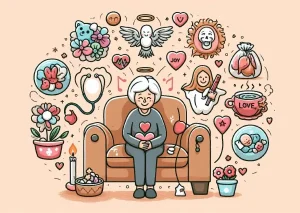Today, on World Hospice and Palliative Care Day, I am reflecting on those who provide care in life’s final chapters, and also to consider what truly makes palliative care “whole-person care”.
What is palliative care?
At its heart, palliative care is about improving quality of life when a condition cannot (or will not) be cured. It’s not just for the very last days, but is appropriate from the time of diagnosis of a serious or life-limiting illness, running alongside treatments aimed at prolonging life or controlling disease.

At its heart, palliative care is about improving quality of life when a condition cannot (or will not) be cured. It’s not just for the very last days, but is appropriate from the time of diagnosis of a serious or life-limiting illness, running alongside treatments aimed at prolonging life or controlling disease.
In the UK, palliative care is delivered through a mix of NHS services, hospices, community teams, and charitable providers. Its scope reaches well beyond managing pain: a comprehensive palliative approach addresses physical, emotional, social, and spiritual needs.
Crucially, palliative care is not the same as giving up — it’s about adding life to days, not days to life.
The many dimensions of care
Physical and medical
Pain control, symptom relief (e.g. for breathlessness, nausea, fatigue), medication optimisation, wound care, and coordination of medical treatments form the foundation. In the UK, specialist palliative care teams (in hospitals or hospices) and community nurses support people in managing complex symptoms.
But symptoms don’t exist in isolation. A person’s ability to eat, sleep, move, and maintain dignity intertwines with emotional, social, and existential spheres.
Emotional and psychological
Facing an incurable illness brings fear, uncertainty, anger, grief, and sometimes isolation. Emotional care means recognising these inner experiences:
- Counselling or psychological support (sometimes from clinical psychologists or counsellors)
- Compassionate listening by nurses, social workers, or trained volunteers
- Providing a “safe space” for talking — about hopes, regrets, fears, relationships, and meaning
A person’s psychological state can influence how well symptoms are managed, so this is not a “nice extra” — it’s integral.
Social and relational
Illness often impacts roles, relationships, and life routines:
- Who will manage household tasks, finances, or pets?
- Can a person still participate in family life, or see friends?
- Are there children or carers who need support?
- What about transport, mobility, or adaptations at home?
Social care (e.g. occupational therapists, social workers) and informal networks help bridge gaps. Enabling someone to remain at home, or maintain social ties, has huge emotional value.
Spiritual and existential
This doesn’t necessarily mean religion. Spiritual care may involve:
- Exploring meaning, purpose, or legacy
- Discussing fears about mortality or what comes “after”
- Supporting religious or faith practices if important to the person
- Compassionate presence for the intangible, where words may fail
Many UK palliative services include chaplains or spiritual care providers, and link with faith communities when appropriate.
The medical team is necessary — but not sufficient
The palliative care “team” extends far beyond doctors and nurses.
- Hospice staff bring specialist skillsets and often a culture that blends medical, emotional, and spiritual support.
- Volunteers in hospices or community services provide companionship, practical help, or respite relief.
- Complementary therapies — e.g. gentle massage, aromatherapy, music therapy, art therapy — can help ease anxiety, improve mood, and provide moments of relief and connection (though always used carefully alongside medical care).
- End-of-life doulas (or “death doulas”) are non-medical companions trained to fill gaps where clinical care may not reach. Their role includes emotional, spiritual, and practical support — being present, helping with conversations, coordinating wishes, or simply holding space.
- As one BMJ article puts it, doulas could have “a central role in death care beyond what hospices and medical teams do.”
- They don’t replace the medical team — rather, they complement it, filling gaps of emotional presence, advocacy, and continuity.
- Friends, neighbours, family: The day-to-day reality of care often rests heavily with people close to the person. Their presence, practical support (cleaning, cooking, transport), emotional companionship, and advocacy are critical. Sometimes simply being present, listening, or sharing small routines can make a profound difference.
A multi-layered network of professionals and non-professionals, medical and non-medical, is needed to meet the full range of human needs.

Comments are closed